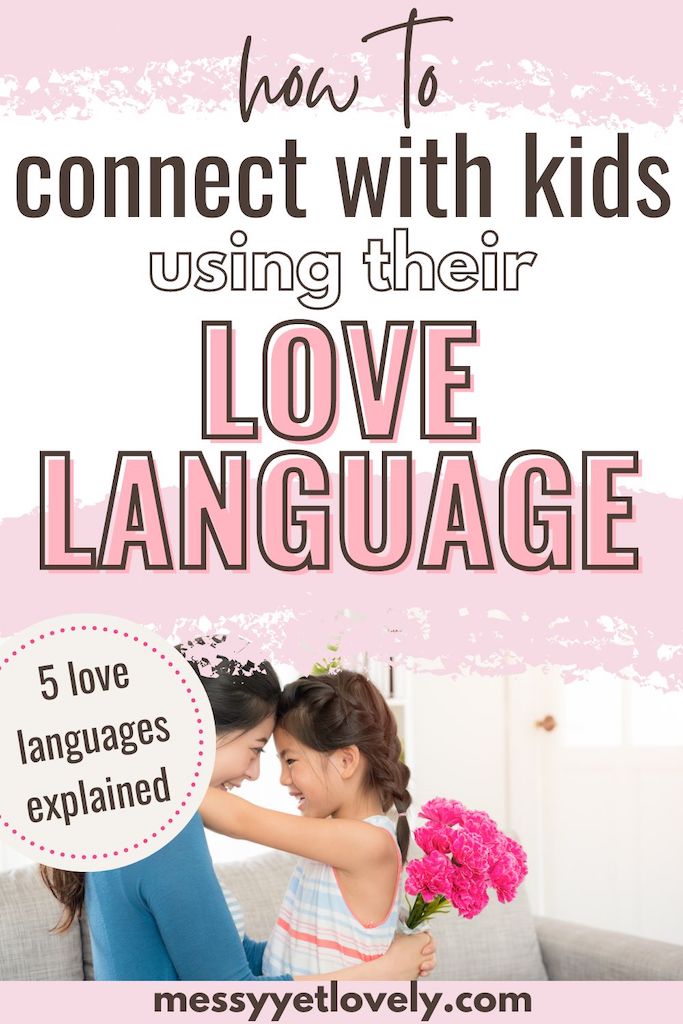All of us express love differently. In the same way, we like to experience love differently too.
Sometimes, the love we have for people fail to reach them, because we all speak different love languages.
Hence it is important to understand what the love language of our children or partner is, to keep the relationships moving strong, by connecting with them using their love language.
Affiliate Disclosure: This page contains affiliate links. If you choose to purchase after clicking a link, I may receive a commission at no extra cost to you.
The concept of love languages was developed by Gary Chapman, Ph.D.—author, speaker, and counselor. He is the author of the bestseller book series, The 5 Love Languages, which includes the book ‘The 5 Love Languages of Children‘, which talk about the love languages of children and how to use the knowledge to make them feel loved and also discipline them accordingly.
So, what are the 5 Love Languages?
The 5 Love Languages are:
- Physical touch
- Words of affirmation
- Quality time
- Receiving gifts
- Acts of service
To identify which language your child speaks, here is a quiz from 5lovelanguages.com. This quiz will give an idea of what love language your child speaks.
I hope by now, you have got an idea of what the 5 love languages are and what love language your child speaks. In the next section, I explain more about how to identify your child’s love language and how to connect with them using this information.
So, please read on.
HOW TO CONNECT WITH KIDS USING THE 5 LOVE LANGUAGES
1. PHYSICAL TOUCH
Some children need a lot of physical touches while others only need a little. If your child loves hugging, snuggles, etc a lot, their love language could be physical touch.
For children whose primary love language is physical touch, the act of touching is a form of communication.
It tells them that you care about them and they are important to you. Touching can also help them feel calm and less anxious in stressful situations.
Here are some ways to express love through physical touch with kids whose love language is physical touch:
- Hold their hands while walking in the mall, in the park, etc.
- Give them lots of hugs, kisses, pats on the back, rubs, etc.
- Massage – Massage their heads, arms, legs, etc when talking.
- If your kids are young, let them sit on your lap when reading books. For older kids, let them rest their heads on your lap during bedtime reading.
- Daily cuddle time – Kids who love physical touch can’t miss out on cuddles. Take a few minutes every day to cuddle them before bedtime and first thing in the morning.
- Snuggle with them when watching movies or when reading books to them.
- Have group hugs including both parents and siblings. It will help the child to develop a bond with not only you but also with their siblings.
- Tickles – While some people love tickling, others absolutely hate it. If your children are ticklish, indulge in a tickles game once in a while.
- Physical games – Any game including some physical touch like Twister, tag game, etc.
- Receive hugs – Kids who love physical touch may come to you for hugs frequently. Even if you are not a person who likes hugs, receive the hug and not let go until they do, because they might have come to you as their love tank requires some filling up. Understand that it is really important for them and never reject a request for a hug.
What to avoid: Neglecting them physically.

2. WORDS OF AFFIRMATION
Words of Affirmation is a love language that uses words to affirm and express feelings. Children who speak this love language feel most loved when they are told how special they are, what you appreciate about them, and what you enjoy doing with them.
If your child speaks the love of the language of words of affirmation, they might be someone who gives out compliments or says “I love you” often. Reciprocating them using the same language can help to deepen your bond with them.
Here are some ideas to connect with children who speak the language of words of affirmation.
- Say ‘I love you’ often
- Use encouraging phrases often
- Write random love notes and place them on their table, lunch box, etc
- Appreciate their qualities and tell them how you love those qualities
- Send loving text messages or handmade cards
- Acknowledge when they do good
- Let them overhear you talking about their good qualities to others
- Use a special name of affection that you use only with them
What to avoid: Avoid criticizing too much. Even when they make mistakes, avoid insults and encourage their effort instead of the end result.
Related: 20 worst things parents should never say to kids

3. QUALITY TIME
Quality time is the act of spending time with the one you love in a way that makes them feel special.
The love language of quality time with kids is when you express your love for them by giving them your undivided attention. It’s about being there for someone, listening to them, and showing them that they are important.
All kids need quality time with their parents. But if your kids especially complain that they don’t get to hang out with you or spend time with you, they are speaking in their love language.
Quality time is the hardest to give because of our busy schedules. Rather than the quantity of time, look for consistent time spent with kids that is of good quality.
If you are consistent with the quality time, the quantity doesn’t matter. But make sure you give undivided attention to each of your kids doing an activity that they like.
Here are some ways to spend quality time with kids:
- Create a daily routine and a fixed time if possible. And spend quality one-on-one time with kids, doing things that your kids want. Consistency is important so that kids know no matter how busy you are, they will get to spend at least ten minutes with you every day. Make a special name for this time too.
- Create family rituals, like daily or weekly board games
- When they come talking to you, look in their eyes and respond.
- If you are a busy parent and nighttime is the only time you can afford to spend with kids, make sure you spend time doing things like reading or just talking about your day.
- Take random walks with them when you get time in your day
- Take your kids on a mommy or daddy special date – to their favorite shows, concerts, movies, or any other place they love. Make sure you spend time with each child separately.
- Weekend trips
- Bring your child on errands
- Do household chores together like cooking, cleaning, gardening, etc.
- Engage in fun activities and games
- Drop the serious act and try being silly and funny. Trust me, it doesn’t take much to make kids laugh.
What to avoid: Being distracted when spending time with them by using screens and not fully listening to them. And not spending enough one-on-one time with each child.

4. RECEIVING GIFTS
The love language of gifts is the feeling of being loved when someone gives you something.
The love language of gifts can be interpreted as a form of communication. It is an effective way to connect with kids and let them know that they are loved.
Gary Chapman says that no love language is exclusive. We all speak most of these love languages, but there are some love languages we speak the most.
For children who like to make handmade things or cards, giving gifts could be their love language.
For example, my daughter sometimes wraps random small things with paper and gifts me. Such expressions point to how they express love and give us a clue on how to give it back.
Here are some ways to connect with kids whose love language is giving gifts:
- Make small handmade cards, or gifts for special occasions and even on ordinary days as a surprise
- Give customized gifts
- If they hint at wanting something, give it as a surprise gift
- Gift special treats or experiences they love
- When they gift you small things, make sure you appreciate them and safely store them forever
- Look for unique gift ideas when you travel and gift them with things that are not available in your place. It need not be expensive, but something that is unique and memorable for your child.
What to avoid: Avoid giving gifts all the time and buying gifts on demand. Make sure you use all the other love languages to speak to them too.
And gifts need not be expensive. More than the gift, it’s always the thought and gesture that count.

5. ACTS OF SERVICE
The love language of Acts of Service is a way to show appreciation and love to the people you care about by doing things for them.
Some people might prefer this love language because it feels more tangible and they can see the effort put in by the person. It also makes them feel important and appreciated, as opposed to just saying “I love you” or “You’re important.”
But as parents, we are serving our kids so much. So it can be hard to draw a line between the things we can do for service and what we should refrain from doing for them to make them independent.
Kids who love helping others will appreciate it so much when you do the same for them too. If your child loves to help others, acts of service could be their love language.
Here are some ideas to connect with kids whose love language is acts of service:
- Help them when they are in a hurry to leave home for school or just anywhere
- Offer a helping hand when they have a hard time studying or doing homework
- Make them special meals and serve them to their room occasionally
- Instead of telling them to hurry, help them to get ready when running late
- Clean their room when they are busy with studies or stressed about something
- Help them clean their rooms or organize their wardrobe for them
- Help them with their extracurricular activities
- Bring them things they need when they ask you to
- Do a chore for them that they normally do by themselves
- Ask them if they need any help when they feel overwhelmed or stressed
What to avoid: Going overboard on serving them and hovering around them doing everything for them, interfering with their independence.

FINAL WORDS
As Gary Chapman says, no love language is exclusive.
Human beings are multi-dimensional. So, we all can speak different love languages. But there are some languages that we prominently speak and learning that for the sake of your relationship with kids is a must.
Like this post? Pin and Save for later!

